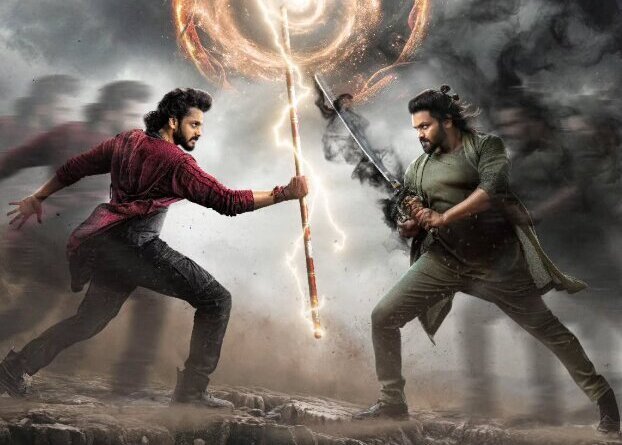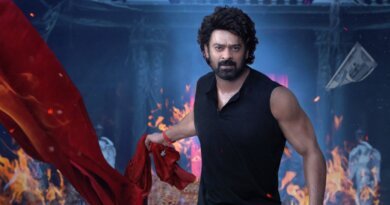Mirai Movie Review

Review
Cast – Teja Sajja, Manchu Manoj, Ritika Nayak, Shriya Saran, Jagapathi Babu, Jayaram, Tanja Keller, Pawan Chopra, Sriram Reddy Polasane, Raj Zutshi, Koushik Mahata
Directors – Karthik Gattamneni
Producers – T. G. Vishwa Prasad, Krithi Prasad
Banner – People Media Factory
Music – Gowra Hari
Runtime – 02 Hrs 49 Mins
Genre – Action Adventure
Release Date – 12-09-2025
Background
Mirai arrives with the weight of expectation following Teja Sajja’s breakout success in Hanu-Man. This time, he steps into the shoes of Vedha, a reluctant hero drawn into a mythic battle rooted in Emperor Ashoka’s legendary nine powers. The film’s premise is steeped in ancient lore, blending historical fiction with superhero fantasy. Director Karthik Gattamneni, known for his visual flair, takes on triple duty as writer, cinematographer, and director. The production house, People Media Factory, backs the project with confidence despite recent setbacks. Manchu Manoj returns to the screen with a fierce antagonist role, while Ritika Nayak and Shriya Saran add emotional depth. The film’s teaser and trailer generated buzz, promising a visually rich and emotionally charged narrative. With a sprawling cast and ambitious scope, Mirai aims to be more than just another superhero flick. It seeks to carve a niche in Telugu cinema’s fantasy genre. The question is—does it soar or stumble?
Plot
Emperor Ashoka, haunted by the bloodshed of war, seals his nine mystical powers into sacred scriptures. These are entrusted to nine warriors whose descendants guard them across generations. In the year 2000, Mahabir Lama (Manchu Manoj), a ruthless seeker of immortality, steals eight of the nine scriptures. The final one, Amaragrandham, remains elusive. Vedha (Teja Sajja), unknowingly linked to this last scripture, becomes the key to stopping Mahabir. Vibha (Ritika Nayak) believes Vedha is destined to protect it. Ambika (Shriya Saran), Vedha’s mother, holds secrets that unravel his true purpose. As Vedha transforms into Yodha, the battle between good and evil unfolds across mystical landscapes.
Artists Performances
Teja Sajja shines with confidence, embodying Vedha’s transformation with conviction. His experience as a child artist and recent success lend maturity to his performance. Manchu Manoj is a revelation as Mahabir Lama, delivering menace with gravitas and style. Ritika Nayak plays her part with restraint, though her character lacks depth. Shriya Saran brings warmth and wisdom to Ambika, anchoring emotional scenes. Jagapathi Babu and Jayaram lend credibility to their roles, adding weight to the narrative. Getup Srinu provides comic relief, though his scenes feel slightly stretched. Venkatesh Maha and Kishore Tirumala appear in brief cop roles, offering light moments. Tanja Keller and Pawan Chopra add international flavor to the ensemble. Overall, the cast delivers a balanced mix of intensity and charm.
Technicalities
Gowra Hari’s background score elevates the film, especially during key transformation and battle sequences. The Jaithraya song stands out for its placement and emotional resonance. Visual effects are impressive, particularly the giant eagle and Himalayan sequences. Karthik Gattamneni’s cinematography captures grandeur with finesse. His direction shows growth, especially in pacing and dialogue balance. Editing by A. Sreekar Prasad could have been tighter, especially in the first half. The decision to exclude the “Vibe Vundi Baby” song helps maintain narrative flow. Production design reflects the mythic tone with rich textures and symbolic motifs. Costume design supports character arcs, especially Vedha’s evolution. The use of AI in visuals is noticeable but mostly effective.
Positives
- Teja Sajja’s confident portrayal of Vedha
- Powerful background score by Gowra Hari
- Visually stunning sequences with the giant eagle
- Engaging mythic backdrop inspired by Ashoka’s lore
Negatives
- Pacing issues in the first half and hero Rana entry at climax
- Unnecessary comedy segments dilute tension
Analysis
Mirai is a bold attempt to fuse mythology with superhero storytelling. The film’s strength lies in its layered narrative and visual ambition. Karthik Gattamneni crafts five standout blocks that anchor the story—Vedha’s transformation, Mahabir’s backstory, the Jaithraya montage, the pre-interval Himalayan sequence, and the climactic battle involving Lord Rama. These segments are well-paced and emotionally resonant, offering adrenaline spikes at regular intervals. The screenplay avoids excessive exposition, relying instead on symbolic dialogue and visual storytelling. Lines like “Devudiki eduru velle vadini…nuvvu edurukobotunnav” encapsulate the film’s core conflict with poetic brevity. The integration of Ashoka’s secret society adds depth without overwhelming the audience. Gowra Hari’s score is a standout, enhancing mood and tension. His work in Mirai surpasses even his acclaimed compositions in Hanu-Man, showcasing originality and emotional range. The visual effects team deserves credit for delivering high-quality output on a modest budget. The giant eagle, in particular, is a triumph of design and execution. However, the film falters in its first half. The setup feels stretched, with comedy and romance sequences that lack relevance. Editing could have trimmed at least twenty minutes to improve flow. The use of AI-generated visuals, while innovative, sometimes breaks immersion due to their artificial feel. Ritika Nayak’s character, though central, lacks development, limiting her impact. Despite these flaws, Mirai succeeds in its core mission—to entertain and inspire. It offers a fantasy world that children will adore and adults will appreciate for its thematic richness. The film’s message of legacy, sacrifice, and transformation resonates across age groups. Teja Sajja emerges as a reliable lead for genre-defying cinema, while Manchu Manoj reclaims his space with a powerful performance. Karthik Gattamneni proves that vision and conviction can overcome budgetary constraints. Mirai may not be perfect, but it’s a step forward for Telugu cinema’s fantasy genre. It invites viewers to dream, believe, and cheer for the underdog. With tighter editing and more nuanced character arcs, future installments could elevate the franchise further. For now, Mirai stands tall as a mythic adventure with heart and spectacle.
Final verdict :- Mirai is a visually rich mythic adventure that mostly delivers on its promise
Rating :- 3.1/5




